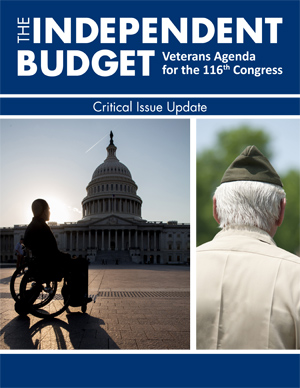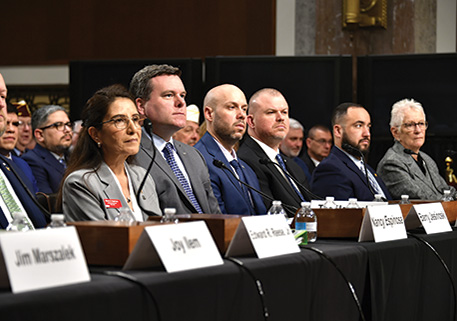 Where the law stands one year later
Where the law stands one year later
The VA MISSION Act—historic legislation aimed at expanding access to and improving the quality of care for veterans—went into effect in June 2019. Now, a year later, DAV and the two co-authors of The Independent Budget (IB), Paralyzed Veterans of America and Veterans of Foreign Wars, are weighing in on the status of the implementation with the release of The Independent Budget Veterans Agenda for the 116th Congress: Critical Issue Update.
The most critical issue, according to the IB co-authors, remains the full and faithful implementation of the VA MISSION Act. This time last year, the group issued a report containing 26 specific recommendations to help ensure that the compromises reached under this historic legislation would be effectively carried out.
This new report evaluates the progress on those recommendations—which primarily pertain to expanding veterans’ access to high-quality, timely health care both through the Department of Veterans Affairs and community providers.
“Since the MISSION Act has only been in effect since last June, many of the reforms have not yet been implemented,” said DAV Washington Headquarters Executive Director Randy Reese. “It’s too soon to judge whether the law will ultimately achieve the intended goal of improving veterans’ access to high-quality medical care, but it’s important that we keep a close eye on the process.”
The IB co-authors report that, overall, the transition of the VA’s community care program from the Veterans Choice Program to the VA MISSION Act’s Community Care Network was significantly better than the transition to the original Choice Program. However, of the 26 recommendations made in the 2019 report, only one has been fulfilled, 11 have not been fulfilled, and 14 are considered “to be determined,” which indicates partial or no fulfillment, with aspects that cannot be fully evaluated at this time.
For each recommendation, the report gives a status rating, and in many cases, supplemental recommendations about how the VA, Congress or both can help to achieve the goal.
Among those recommendations that the IB rates as not fulfilled are conducting an open, transparent process for developing market-area assessments and strategic plans that actively engage veterans service organization and veteran stakeholders; the equal application of quality and competency standards across both VA and non-VA providers to ensure the highest level of care possible for veterans; and the creation of a tiered integrated network that places VA providers first and the Department of Defense, federal partners and academic affiliates second when VA care is not accessible.
“DAV, in particular, is disappointed in the VA’s failure to expand the comprehensive caregiver assistance program to support veterans injured prior to 9/11,” said Reese. “That portion of the VA MISSION Act is something our organization fought very hard for, and the continued delays are just unacceptable.”
The report is far from a final evaluation of the VA MISSION Act, according to the group.
“However, we believe it is imperative to establish these benchmarks early on to hold the VA and Congress accountable for the full and faithful implementation of the law, and ultimately, the reform of the veterans health care system,” said the IB co-authors. “America’s veterans have earned and deserve nothing less, and we look forward to working in collaboration with leaders in the VA and Congress to bring the vision of the VA MISSION Act to fruition.”
For more than 30 years, the Independent Budget veterans service organizations have worked to develop and present concrete recommendations to ensure that the VA remains fully funded and capable of carrying out its mission to serve veterans and their families, both now and in the future.
Learn more
The full report, along with the IB recommendations for fiscal years 2021 and 2022, can be viewed at independentbudget.org.






